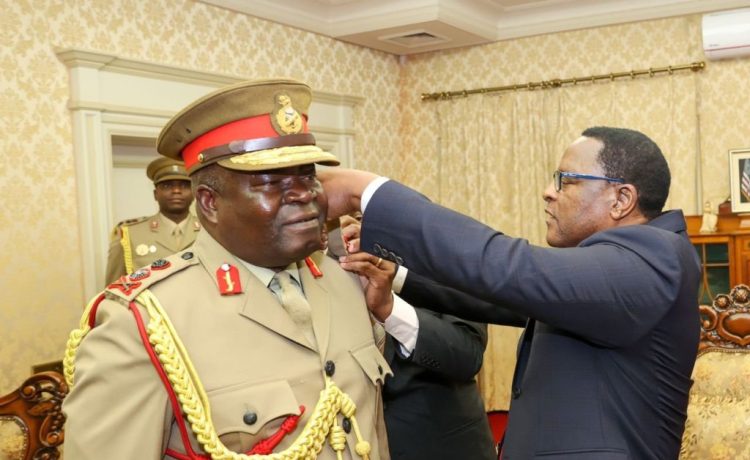SHADOW OF MISMANAGEMENT: UNCOVERING FINANCIAL IRREGULARITIES IN THE MALAWI DEFENCE FORCE

President Lazarus Chakwera, Commander in Chief of Malawi's Armed Forces, officiating the induction ceremony of General Phiri as the new Commander of the Malawi Defence Force (MDF).
… General Phiri Allegedly Central to NAO Document Forgery
… MDF Defends Financial Anomalies as Necessary for Sensitive Operations
BY GREGORY GONDWE
The Platform for Investigative Journalism (PIJ) has secured the Malawi Defence Force (MDF) Management Letter for the fiscal year ending 30th June 2021, which exposes a series of financial irregularities and instances of unethical behaviour within the MDF, an entity tasked with safeguarding national security.
In the communication that questions the integrity of military spending, the MDF finds itself embroiled in a series of financial discrepancies and dubious procurement deals.
In the last two months, PIJ has unearthed not only systemic fiscal irresponsibility within the MDF as the latest but also exposed alarming irregularities in high-profile acquisitions, including helicopter and armoured personnel carrier contracts.
These findings cast a long shadow over the defence sector, raising serious concerns about the stewardship of public funds and the transparency of military procurement processes.
As the nation grapples with these revelations, the spotlight turns to the MDF’s internal controls and the accountability of its top brass, with far-reaching implications for national security and public trust.

This document, produced by the National Audit Office (NAO), is a vital means of communicating findings to various ministries, departments, and agencies, including the MDF, of audit queries.
Among the most notable disclosures is the alleged misconduct of the then-deputy commander, now Commander General Paul Valentino Phiri.
The report suggests that General Phiri might have forged a document from the NAO to claim allowances improperly.
In an interview with PIJ, General Phiri vehemently denies these allegations, accusing the journalist of acting under the influence of external entities attempting to malign his reputation, an effort he asserts has been tried before and proved unsuccessful.
The report meticulously details audit queries and findings following a comprehensive audit, shedding light on the financial and administrative practices within the Malawi Defence Force (MDF). This report not only highlights areas of concern but also provides recommendations for rectifying identified issues as well as comments from the MDF Management.
Breach of Trust: The Forgery Scandal
The Auditor General’s Certificate Reference No. NAO/MDA/10/1, dated 30th July 2020, highlighted outstanding claims totalling K562, 819, 069. 25 for overseas training allowances, as per the National Audit Office’s (NAO) letter. An examination of the Malawi Defence Force’s (MDF) expenditure records revealed significant payments made towards these allowances within the audited period.
The issue continued with a letter, reference DOLS/A/110/4, from the Chairman of the Overseas Allowance Board at the Headquarters of the Malawi Defence Force, dated 19th April 2021.
Addressed to the DOF [Director of Finance], the letter, titled “REQUEST FOR PAYMENT OF ALL OUTSTANDING OVERSEAS ALLOWANCES,” was authored by Brigadier General Dan Kuwali, who was then serving as the Chief of Legal Services for the Malawi Defence Force.
General Kuwali’s letter referenced three key documents: a letter from the National Audit Office (NAO), reference NAO/MDA/10/1, dated 30th July 2020; a letter from the Chief of Staff, reference number A/125/2, dated 16th July 2019; and a document from the Department of Legal Services (DoLS), reference number DOLS/A/110/4, dated 22nd August 2019. These documents collectively underscored the necessity to request the clearance of pending overseas allowances owed to MDF officers.
“With reference to the letters cited above and related correspondence on the subject, please find attached hereto an audited list by the National Audit Office (NAO) of outstanding overseas allowances in appendices A and B of the letter in reference A above,” Brigadier General Kuwali stated in the letter.
He further noted that since MK63,913,894.80 had already been disbursed following the audit, he was submitting an updated list of all remaining unpaid overseas allowances.
General Kuwali’s directive, as per the instruction of the Defence Force Commander, was to expedite the payment of these allowances.

“Therefore, please pay a total sum of MK452,449,929.60 to all the service members as allocated in the attached list as soon as practicable,” Kuwali instructed in the correspondence.
The NAO communication seems to agree with the need to speed up the payment as it acknowledges that the audit process unveiled that the MDF had long-standing debts regarding overseas allowances dating back to 2011. To address these arrears, the MDF management proactively engaged the NAO for an audit, resulting in the issuance of the aforementioned certificate.
However, following the completion of these payments, the National Audit Office (NAO) raised concerns regarding the manner in which they were executed.
“In the process of auditing how these payments were implemented, we noted that some officers were paid overseas allowances, but their names were not on the audited list as shown on the certificate issued by the Auditor General,” the NAO letter stated.
Table 7 of the NAO communication, titled ‘Officers Paid Overseas Allowances Arrears Not in the Auditor General Certificate,’ detailed the discrepancies.
It showed that Major Gen P.V. Phiri received K33,071,270.00, processed under Voucher No. 101PV5027437 and Cheque number 379028. Lt Col G. Njete, using the same voucher and cheque, was paid K5,460,000.00, while Lt B J Osman, with Voucher No. 101PV5027413 and Cheque No. 379034, received K240,000.00, cumulatively amounting to K38,771,270.00.

The management letter underscored the ‘Risk and Implication’ of such discrepancies: “Failure to adhere to Government regulation may provide opportunity to scrupulous officials to defraud government resources.”
The NAO recommended, “Management should follow government regulations at all times and ensure that the passports in question are produced for audit inspection.”
In response to these audit findings, the MDF commented in the letter, “We need to verify first if what you are saying is true. If it’s true that some officers were paid overseas allowances who were not on the Auditor General’s Certificate, appropriate action will be taken to correct the anomaly.”
The National Audit Office (NAO) appendix on Overseas Allowances highlights a discrepancy in the list of officers approved for payment. The original roster, certified by The Auditor General’s Arrears Certificate, was apparently substituted with another list that included three additional names not part of the original certification. Notably, while the original list was printed in landscape format, the names in question were presented in portrait format, suggesting potential manipulation or forgery in the documentation.
Notably, following this communication, the General implicated in these discrepancies was appointed as the MDF commander, with the matter still pending resolution.
The Core of the Crisis: A Breakdown of Financial Discipline
An audit of the MDF’s financial records for the fiscal year ending June 30, 2021, unveils a troubling landscape of fiscal indiscipline.
In a recent audit review of the Malawi Defence Force (MDF), it was revealed that the financial allocations underwent significant adjustments.
The original budget for the 2020/2021 fiscal year, earmarked for operational recurrent transactions, was set at MK62,835,537,362.00. However, this figure saw an upward revision, escalating to MK72,054,129,869.96.
The audit findings highlighted a noteworthy aspect of the MDF’s budget performance. The MDF’s final expenditure almost precisely mirrored the revised budget, with the actual spending recorded at MK72,054,129,869.95.
This expenditure figure indicates an exceptionally high budget utilization, essentially reaching 100.01 per cent of the revised budgetary allocation.
According to NAO, this near-perfect alignment between the revised budget and the actual spending raised questions about the efficiency and accuracy of the MDF’s financial planning and execution.
Funds Deviation Queries
In a notable deviation from standard financial protocols, the Malawi Defence Force (MDF) was found to have misallocated funds totalling MK314, 511, 896.75.
This finding emerged in stark contrast to the Treasury Instructions Finance 4.14.1 of 2004 and the Public Finance Management Act of 2003, Section 25.
These regulations mandate that specific approval from the Secretary to the Treasury, endorsed by the Minister, is required for any reallocation or transfer of funds between different budgetary outputs.
However, the MDF redirected funds across various cost centres without this requisite approval.
The detailed misallocations included notable amounts to different barracks and departments: Changalume Barracks (MK2,000,000.00), Chilumba Barracks (MK2,792,000.00), Cobbe Barracks (MK229,500.00), Engineers Battalion (MK13,801,851.50), Headquarters (MK203,959,189.69), and others, cumulatively amounting to over MK1.08 billion.
According to NAO, this misallocation of funds poses a significant risk, as diverting funds to unrelated items can lead to a failure in accomplishing planned activities.
NAO’s recommended course of action is to seek authorization from the Secretary to the Treasury prior to any fund reallocation.
Responding to these findings, the MDF acknowledged the challenge, stating, ‘We have a serious challenge here at MDF. Most of the time, we are assigned activities that are not within our budget or mandate. In such circumstances, we have no choice but to misallocate.'”
Payment Using Quotations Instead of Original Invoices
In a significant departure from standard financial protocols, the Malawi Defence Force (MDF) made payments totalling MK262, 479, 771.46 using quotations rather than original invoices.
According to NAO, this practice contravenes the Accountant General’s Final Desk Instruction No. 6.4 of 2007, which mandates that local purchases should be made against Local Purchase Orders (LPOs) issued by authorized officers and supported by original, arithmetically correct invoices and duplicate LPOs.
The breakdown of these payments across various cost centres highlights the extent of this irregularity.
Changalume Barracks paid out MK3,000,000.00, Chilumba Barracks MK13,768,879.39, Cobbe Barracks MK42,308,489.58, and similarly significant amounts were allocated to other units, including the Command College, Headquarters, and various other barracks and airbases, culminating in the substantial total amount.
NAO says the deviation from established procedures raises the risk of fraudulent payments, as reliance on quotations rather than verified invoices lacks the necessary checks and safeguards.
The MDF management, in response to these findings, indicated the need for a review of the schedules before providing a comprehensive response.
In light of these revelations, NAO recommended that the MDF adhere strictly to making payments using original invoices to prevent potential financial improprieties and to ensure transparency and accountability in its financial transactions.
MDF’s Sensitive Core Duty Blamed for Failure to Account for Fuel Purchase
In another clear breach of financial regulations, the Malawi Defence Force (MDF) failed to account for fuel purchases totalling MK220,370,890.92 properly.
According to NAO, this finding contravenes the Treasury Instructions 5.9 (b) of 2004, which mandate that all transactions must be recorded in a primary government record or ledger.
An audit revealed that while the MDF procured significant quantities of fuel, these purchases were not recorded in the fuel ledger.

NAO says this lapse in record-keeping made it challenging for auditors to verify the proper use of the fuel.
Notably, substantial amounts were spent across various units: Chilumba (MK3,800,000.00), MAFCO (MK1,450,000.00), Engineers Battalion (MK24,694,560.00), Marine (MK18,730,231.00), and the largest portion at Headquarters (MK171,696,099.92).
NAO says such oversight raises serious concerns about the potential misuse of fuel, given the absence of proper disposal records.
The auditors recommend that the MDF should rigorously record all fuel procurements in the fuel register before distribution to enhance transparency and accountability.
In response, MDF management noted the challenge of accounting for fuel used in directive tasks, some of which are for sensitive activities that may not follow standard accounting procedures due to security reasons. They assured that all fuel purchases were accounted for and agreed to provide the necessary documentation for audit verification upon reviewing the auditors’ schedule.
Trouble with Food Rations Purchase
In a significant deviation from established financial protocols, the Malawi Defence Force (MDF) failed to properly account for K208,945,244.71 in food rations purchased.
NAO says this practice contravenes Treasury Instruction 11.7.1.2 of 2004, which mandates the recording of bulk consumable stores in a Consumable Stores Ledger for subsequent distribution.
The audit report highlighted that several MDF units had spent on substantial rations without proper documentation.
Notable amounts included Chilumba Barracks with MK40,205,132.47, the Parachute unit with MK26,882,417.24, Lilongwe Airbase with MK2,433,000.00, and MAFCO with the largest share of MK139,417,695.00.
NAO says this lack of record-keeping raises concerns over the potential misuse and abuse of the rations, as the absence of detailed ledgers hampers accountability, and it recommended action is for the MDF to ensure that all rations are adequately recorded from the point of purchase to the issue.
In response to the audit findings, MDF management acknowledged the need for better record-keeping and committed to coordinating with all concerned army units to provide the necessary rations ledgers for further audit verification.
Using Ration Suppliers that Never Bid
In another clear departure from standard procurement procedures, NAO established that the Malawi Defence Force (MDF) procured food rations valued at MK108,319,085.00 from suppliers who did not participate in the official bidding process.
NAO says this action contradicts Section 49 (1) of the Public Procurement and Disposal of Assets (PPDA) Act of 2017, which requires the acceptance of bids and contract signing with successful bidders before procurement.
The breakdown of this procurement across various MDF units is as follows: Chilumba Barracks spent MK40,205,974.00, Cobbe Barracks MK28,052,846.00, Kamuzu Barracks MK17,754,575.00, Lilongwe Airbase MK4,400,000.00, Marine MK11,289,035.00, and Parachute Battalion MK6,616,655.00.
NAO Such procurement practices present a risk of overpaying for rations, as purchasing from non-bidding suppliers lacks the competitive pricing mechanism of the tender process. The recommendation is for the MDF to adhere to purchasing rations strictly from suppliers who have participated in and won the tendering process.
In response to this issue, MDF management explained that they opted for suppliers from the previous financial year due to delays in awarding new contracts and some awarded suppliers’ refusal to supply at contracted prices following recent economic devaluations.
Changalume Barracks and Misplaced Vouchers
In a concerning lapse of compliance with the Public Audit Amendment Act of 2018, Section 7 (1), the Malawi Defence Force (MDF) at Changalume Barracks failed to provide essential payment vouchers and related records for the purchase of rations valued at K59,133,988.28 during an audit.
This Act mandates full access for the Auditor General and authorized personnel to all relevant financial documents and locations for audit purposes.
NAO says this lack of documentation presents a significant risk and implication, suggesting the possibility that the MDF may have paid for rations that were never delivered, potentially leading to a considerable loss of public funds. The auditors have recommended ensuring the availability and verification of such critical financial records to prevent such losses.
In response to this issue, MDF management acknowledged the missing vouchers, stating that they were merely misplaced. They committed to locating these documents and providing them for subsequent audit verification as per the requirements.
Overpayment of Purchased Goods
In a clear breach of financial protocols, the Malawi Defence Force (MDF) was found to have overpaid for goods and services by a total of K642,580.00, as per Treasury instructions (2004) 5.5.7. This instruction states that any discovered overpayment should be immediately refunded unless a repayment plan is authorized.
Upon reviewing the MDF’s payment records for goods and services, it was revealed that there were two instances of overpayment amounting to the total sum mentioned above. As of the time of the audit, NAO indicated that these overpayments had not been refunded, as detailed in the NAO letter.
The auditor general’s office says this oversight resulted in the loss of public funds due to overpayment. The recommendation to the MDF management is to diligently follow up and recover these overpaid funds as quickly as possible to mitigate further financial loss.
In response to the audit findings, MDF management commented that they would review the schedules and verify the overpayments with the responsible officers. They committed to taking appropriate action to recover the funds and to provide evidence of these corrective measures.
Store Items Lack Documents
In violation of Treasury Instruction 5.9 (b) of 2004, which mandates recording all transactions in a primary government ledger, the Malawi Defence Force (MDF) failed to account for store items worth K52,824,376.47 in their ledger. This lack of documentation was revealed during a review of the store’s records, hindering the audit team’s ability to verify the proper use of these items.
A breakdown of the unrecorded expenditures shows significant amounts expended by various units: Parachute Battalion (K932,500.00), MAFCO (K46,298,955.97), Engineers Battalion (K2,392,920.50), and Lilongwe Airbase (K3,200,000.00).
NAO says this oversight poses a substantial risk, as unrecorded store items may be diverted or used for purposes other than those intended without proper disposal records to track their usage. The auditors recommend that all items purchased for the stores should be diligently recorded in the ledger, and all recipients should sign upon receipt to ensure accountability.
In response to this finding, MDF management has committed to collaborating with the concerned army units to provide the necessary ledgers for a thorough audit review.
Misplaced Contract Documents
In another significant breach of financial management procedures, the Malawi Defence Force (MDF) failed to produce essential contract documents for audit, involving transactions amounting to K1,248,635,274.06.
NAO observed that this lapse contravenes the Treasury Instructions (2004) 5.16.1, which mandates controlling officers to implement internal control measures for transaction processing and maintain accurate accounting records to support all financial activities.
During the audit, it was found that payment vouchers for contracts related to goods and services, summing up to over K1.24 billion, were not available for inspection. This absence hindered the audit team’s ability to verify the legitimacy of these contracts and the corresponding expenditures.
NAO points out that this oversight risks payments being made against potentially dubious contracts, leading to the misuse of public resources. The recommendation is for MDF management to ensure the availability and submission of these contract documents for proper accountability.
In response, MDF management expressed surprise over the missing documents, affirming that the contracts should be available within the procurement department and promised to provide them for the audit process.
Beyond Numbers: The Helicopter and Armoured Vehicle Deals
The financial management oversight links to larger, more concerning transactions, such as the MDF’s acquisition of helicopters and 32 armoured vehicles, shrouded in secrecy and lacking clear procurement protocols, which exemplifies how financial discrepancies can pave the way for potentially exploitative political dealings. These purchases, critical for national defence, have been tainted by a lack of transparency, raising concerns about their legitimacy and the procurement process’s integrity.
MDF Commander’s Take
When approached for comments regarding the allegations of forgery and other financial discrepancies within the Malawi Defence Force (MDF), the MDF Commander General Paul Valentino Phiri extended an invitation to the journalist for a direct discussion.

“Come to my office if you want information on all these concerns of yours. It appears you understand the MDF better. Report using factual based data & not rumours. Likewise, I hope that your curiosity is not being driven by egos of disgruntled paymasters. Hope to see you. Thank you,” General Phiri stated.
Two hours after the initial response, MDF Commander General Paul Valentino Phiri further communicated through WhatsApp:

“Dear Mr. Gondwe. I had earlier indicated that you should come to my office for a chat on the issues you had asked. My position was that this is an MDF matter and not a personal matter. As such, you may wish to have a chat with relevant officers that can enlighten you as opposed to just hearing from me, as you would think I am being biased towards myself,” the General messaged.
“I am, therefore, hoping that you will show up. You can always feel free to contact my Staff Officers, need be. That way, you will have an objective position which you can communicate to the public, as opposed to the sensational elements which are just being given to you by the person who has always been pushing this false narrative,” he continued.
The General added a note of caution: “By the way, note that we are aware of who is giving you all this information. My only worry is that you are not being cautious enough to verify the details. If not careful, this gentleman will soon land you in trouble.”
He concluded with a warning: “This is brotherly advice.”
In a subsequent message, General Phiri addressed the possibility of PIJ not meeting his officers. He stated, “You may wish to know that the gentleman giving you the stories already made similar efforts before. His main intention was to discredit me not to be appointed Commander. However, his motives didn’t work as it came clear that there was no issue at all.”

The General further provided five-story links, stating, “To refresh yourself and perhaps, to remind yourself that there is nothing new you are [investigating] here. You are just being [used] to publish and refresh same fake stories.”
He continued, “As you publish your story, I am certain the public will be the best judge: that you are not doing your work in the public interest, [but you are] being used by some disgruntled officers to advance their motives. Good luck as you recycle the story.”
“Here are some links for your situation awareness. As you will notice, the same gentleman giving you the false news also made attempts to report to ACB but was later embarrassed when his ill motives came out clearly. Now, he is using you. I am sure you can do better,” an outraged Army General concluded, sharing the following links for PIJ reference:
PIJ remained resolute in the face of the MDF Commander’s strong remarks, expressing appreciation for his response and the invitation to discuss the issues with his officers.
PIJ conveyed to the commander that their information gathering adhered to rigorous journalistic practices, sourcing information from a variety of contacts both within and outside the MDF and assured that the confidentiality of these sources would be maintained in line with journalistic ethics.
PIJ emphasized that their primary focus was on the facts and evidence presented in the National Audit report rather than on personal conflicts or individual characters within the MDF.
PIJ clarified that the essence of their inquiry was rooted in the findings of the audit report, which was provided to the commander to contextualize their questions.

PIJ pointed out to the commander that the concerns raised by the documents pertaining to the financial procedures and decisions within the MDF are matters that are of significant public interest.
They reiterated that their intention was not to pursue a personal vendetta against any individual but rather to seek transparency and accountability in the handling of public resources.
In his response to PIJ, the MDF Commander provided this year’s Auditor General’s report on government accounts.
“Specifically, to assist you, go to page 26 of the report, which is about the MDF’s performance & status of accounts. The details which you had sent to me & concerning your areas of investigations are not there,” General Phiri stated, indicating his unfamiliarity with the NAO’s Letter of Management regarding the MDF.
He suggested, “Find out more from your source about their origin. I thought this document would be able to assist you more with your investigation. Please don’t find yourself on the wrong side of the law by accusing people wrongly,” cautioning PIJ against potential legal repercussions.
Continuing, he remarked, “It is a known fact that you are in a self-imposed hiding without a cause. Please come out. Nobody is after you. You are a free citizen of Malawi. Otherwise, you are being encouraged to be objective in your work & not to be wasting time smearing other people with dirt.”
Adding further, General Phiri said, “My thinking is that you are learned enough not to be involved in such cheap dealings. I am reserving my comment just to spare you from the ridicule that you are getting money from disgruntled paymasters who are retired & tired in addition to being with expired shelf life. Enjoy South Africa but please be advised that your sojourns there are futile.”
Comparing NAO’s Management Letter to Auditor General’s Report
In a recent development, General Paul Valentino Phiri responded to the Platform for Investigative Journalism (PIJ)’s inquiries by sharing the Auditor General’s Report on the Government of Malawi’s Accounts for the year ended 31st March 2022.

This document, contrasting yet partially echoing the Management Letter obtained by PIJ, sheds light on some financial practices within the Malawi Defence Force (MDF) for the fiscal year ending 30th June 2021.
The report revealed that the MDF’s initially approved recurrent budget, which stood at K62,835,537,362, was later revised upward to K72,054,129,869.96. Remarkably, the actual expenditure tallied to K72,054,464,549.95, indicating a full utilization of the revised budget. However, beneath this seemingly efficient spending lay a series of financial missteps.
A significant finding was the misallocation of K314,511,896.75, a transaction conducted without the necessary approval from the Secretary to the Treasury. This issue of non-compliance hinted at deeper systemic problems within the MDF’s financial management.
Additionally, the report brought to light the issue of procurement irregularities. Food rations worth K108,319,085.00 were purchased from suppliers who had not participated in the standard bidding process, raising questions about the transparency and fairness of the procurement practices.
Further, the audit disclosed that payment vouchers and related records for rations, amounting to K59,133,988.28, were conspicuously absent during the audit, obstructing a clear view of the transaction’s legitimacy.

Another point of concern was the failure to produce contract documents for audit inspections. Payments for goods and services, totalling an astounding K1,248,635,274.06, were made without the backing of the necessary contract documentation, leaving a gap in accountability.
Despite the comprehensive audit findings, a notable omission in the General’s Report was the mention of General Phiri’s alleged involvement in document forgery, an issue that was highlighted in the Management Letter obtained by PIJ.
This omission in the reports led to General Phiri dismissing PIJ’s inquiries about the financial discrepancies and the alleged forgery.
His response indicates a reluctance to address these specific allegations, particularly those concerning his personal conduct, underscoring a potential area of conflict, and necessitating further scrutiny into the MDF’s financial dealings and leadership accountability.
Discussions of the Letter of Management Findings
The documentation from the National Audit Office (NAO) clearly indicated that the contents of its report were discussed with the management of the Malawi Defence Force (MDF) on 10th November 2022. Present at this meeting from the MDF side were retired General Vincent Nundwe, the then MDF Commander, Colonel R Gausi, Chief of Staff, A Mmadi, the Chief Accountant, and K. Msiska, Staff Officer – Finance. Representing the NATIONAL AUDIT OFFICE were Jonathan Chilombo, Chief Auditor, alongside auditors Eligoe Madeya, Zacharia Kaphamtengo, and two interns, Triza Matanga and Marriam Wachita.
In pursuit of comments regarding any subsequent actions taken by the NAO following its findings and the MDF’s promise to address the audit queries, the Auditor General directed PIJ to NAO spokesperson Rabson Kagwamminga.
Kagwamminga responded, “Well noted. I will revert.” However, as of last Monday, there has been no further response.





